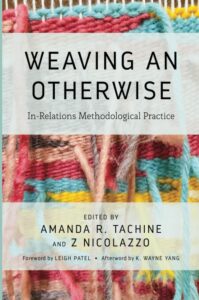NOTE: THIS WEBSITE IS A WORK IN PROGRESS. RESOURCES AND DATA ARE ADDED DAILY.
IMPORTANT: We are in urgent need of funding to keep this project alive and ensure its future. If you’re enjoying the site and see our vision for the project, please consider joining as a paid member or contributing to our crowdfunding campaign today. It is only with your help that we can continue this work.
Thanks so much for your support! – Jes
![]()
Weaving an Otherwise: In-Relations Methodological Practice
share:
Some buttons on this page link to external websites. If you visit one of our affiliate sites and make a purchase, I may receive a small commission at no extra cost to you. More info
- UPDATED: 6.17.2025
- status: in progress
- History, Research
author:
n/a
editor:
Amanda Tachine, Z Nicolazzo
publisher:
date:
4.26.2022
ISBN:
9781642673333
pages:
190
notes:
contents:
description:
What are the modes and ways of knowing through which we approach our research? How can the practice of research bring us closer to the peoples, places, more than human beings, histories, presents, and futures in which we are embedded and connected to? If we are the instruments of our research, then how must we be attentive to all of the affects and relations that make us who we are and what will become? These questions animate Weaving an Otherwise, providing a wellspring from which we think about our interconnections to the past, present, and future possibilities of research. After an opening chapter by the editors that explores the consequences and liberating opportunities of rejecting dominant qualitative methodologies that erase the voices of the subordinated and disdained, the contributors of nine chapters explore and enact approaches that uncover hidden connections and reveal unconscious value systems.
CMOS:
author-date:

